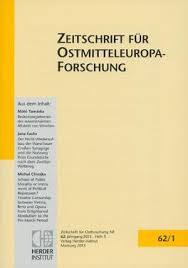Österreich-Ungarns Besatzungsmacht in Russisch-Polen während des Ersten Weltkriegs (1915-1918)
Austria-Hungary’s Government of Occupation in Russian Poland during the First World War (1915-1918)
Author(s): Tamara ScheerSubject(s): Christian Theology and Religion, Military history, Political history, Pre-WW I & WW I (1900 -1919)
Published by: Verlag Herder-Institut
Keywords: Austria-Hungary’s Government; Occupation in Russian Poland; First World War (1915-1918);
Summary/Abstract: Following a successful offensive in the late summer of 1915, the Central Powers, Austria-Hungary and the German Reich, divided Russian Poland between them. The military government of the Dual Monarchy, located in Lublin, constituted Austria-Hungary’s first and longest-lasting government of occupation. Although administered separately from the army at the front, it was still charged with standard military functions: securing peace, law and order, utilisation of provincial finance, as well as maintaining lines of communication. In addition the entire administration was initially taken over by civilian and military staff from the Dual Monarchy. The occupation of Poland was characterised by certain special features which distinguished it from other Austro-Hungarian military governments. One example is the effort made, notwithstanding its military functions, to win the hearts and minds of the population by employing Polish civil servants and military personnel from Galicia or by presenting themselves as a Catholic great power. By supporting Polish national consciousness they were, however, working in contravention of the terms of the Hague Convention as this was occupied Russian territory. Even by the end of the war no clear concepts for the future, which might have provided a rallying point for the population, had been developed. For one thing decisions were always taken with one eye on their German ally, for another there was an influential Polish lobby operating in the Imperial capital, Vienna. Disagreements with their German ally, arising from the separate administrations of the two occupied territories compounded the situation and led to increasing discontentment among the Poles in Austria and the Polish population as a whole.
Journal: Zeitschrift für Ostmitteleuropa-Forschung
- Issue Year: 58/2009
- Issue No: 4
- Page Range: 538-571
- Page Count: 34
- Language: German

